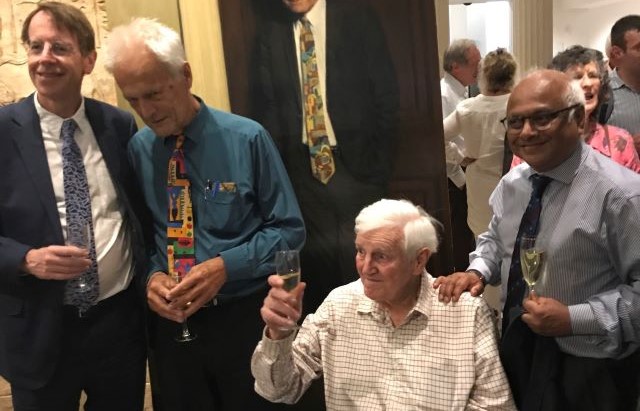

The British Heart Foundation pays tribute to former BHF Chairholder, Professor Peter Sleight, who sadly died on 7th October 2020.
Professor Sleight was our first British Heart Foundation Professor of Cardiovascular Medicine at the University of Oxford, a post which he held for over 20 years from 1973.
Professor Sleight made seminal contributions to our understanding of the underlying processes leading to many cardiovascular diseases including high blood pressure, ischemic heart disease and heart failure. In particular, he was interested in the role played by variability in heart rate.
However, he will probably be best remembered for the series of clinical trials he started in the early 80s which would go on to transform the way that people are treated after a heart attack.
Transforming heart attack treatment
Interested in the theory that beta-blockers might reduce the impact of a heart attack, Professor Sleight kick-started the International Studies of Infarct Survival (ISIS) – a series of huge trials to clarify what treatment was, and was not, worthwhile after a heart attack.
The first trial, ISIS 1, showed that beta-blockers significantly improve heart attack recovery. Giving patients these drugs after a heart attack has now become standard practice worldwide.
Since this very first trial, there have been three more ISIS trials, all of which have improved heart attack care.
The ISIS 2 study looked at whether two anti-clotting drugs - streptokinase and aspirin - could be used to treat heart attacks, with remarkable results.
ISIS 2 studied two treatments and compared four groups. One was given just aspirin, and one just streptokinase. The other two were given both of the drugs, or none at all.
The results were startling. Both groups who received a single drug did significantly better than the patients who had neither. But to most people’s surprise, the benefits for those who were given both streptokinase and aspirin were much bigger than for either drug alone.
The two substances, acting on clots in different ways, appeared to work together perfectly. ISIS 2 and other trials suggested that for every 1,000 patients with a heart attack, rapid administration of a clot-buster would save an average of 29 lives.
An immense contribution to medicine
Professor Sir Nilesh Samani, our Medical Director, said: “Peter was one of our most eminent chairholders and his contribution to cardiovascular medicine has been immense, generating the evidence that underpins the use of common drugs like aspirin. The public owe him a huge debt.”
Professor Sleight may have retired from his BHF sponsored post in 1994 but he continued to work for a further 20 years, attending conferences, giving many prestigious lectures and serving on numerous data monitoring committees.
Throughout his career, Professor Sleight produced over 500 academic papers, authored many textbooks on cardiology and received numerous awards, including the Society of Apothecaries Galen Medal (2000), the Mackenzie Medal from the British Cardiovascular Society (2003), and the lifetime achievement award from the European Society of Hypertension (2005). In 2010 he won the European Society of Cardiology’s highest award - its Gold Medal for outstanding career achievement.
Professor Sleight was a friend and mentor to many researchers, including current BHF Professors Barbara Casadei, Hugh Watkins and Sir Rory Collins.
BHF Professor Hugh Watkins succeeded Professor Sleight as the Field Marshall Earl Alexander of Tunis Chair at Oxford. He said: “Peter has long been a father figure to many in cardiovascular research and clinical care in Oxford and will always be remembered with huge affection and admiration. And, of course, his impact goes round the world. He was truly a giant in our field. I count him as one of the most important influences in my career, and I am one of very many who do so.”



